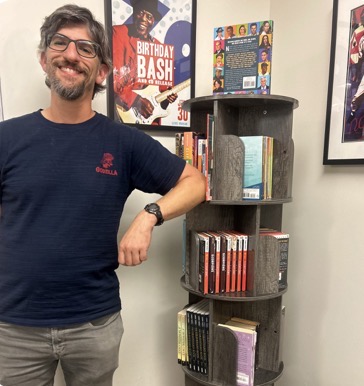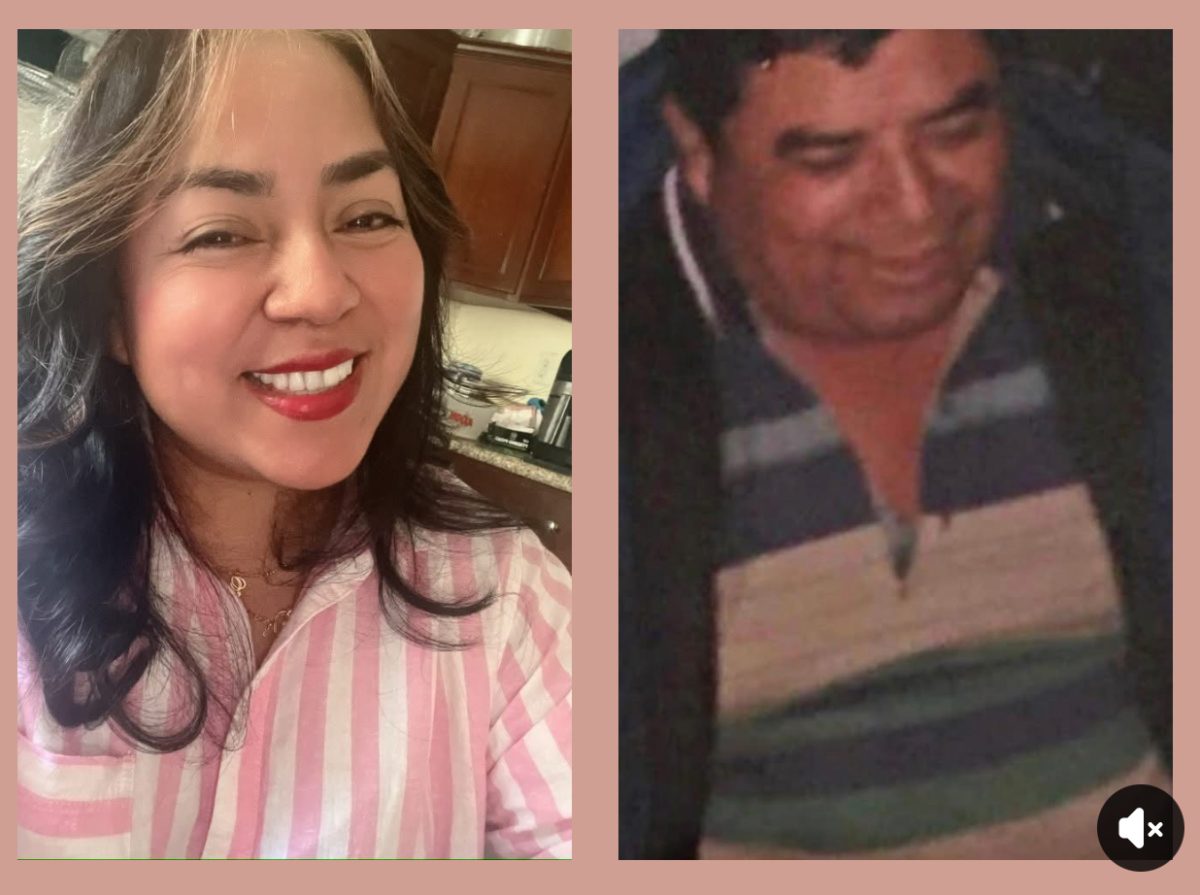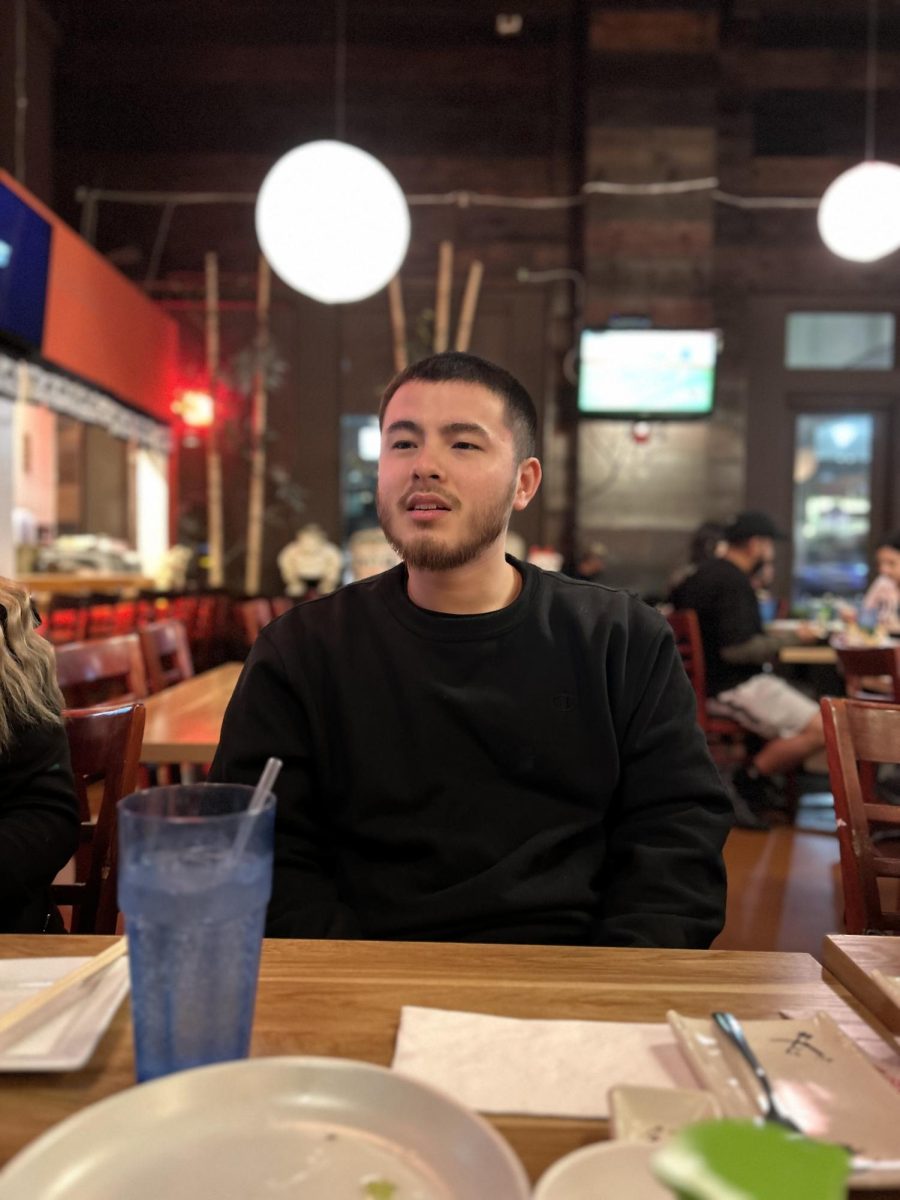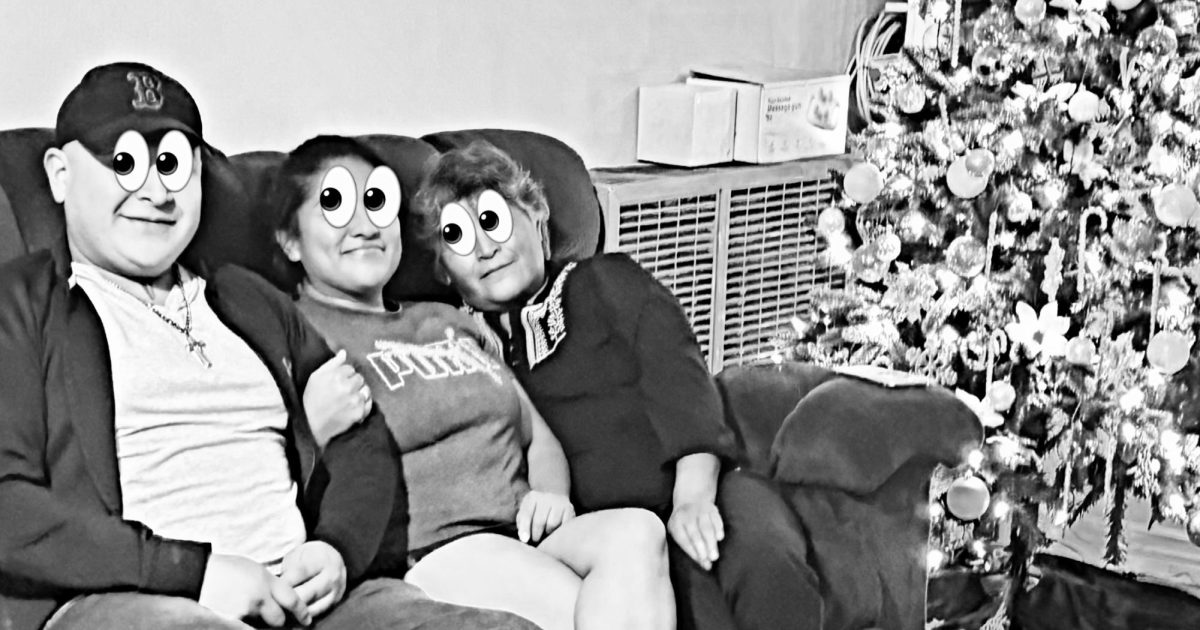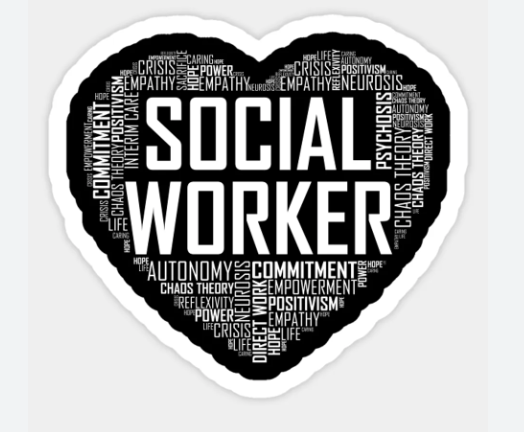
This story is about a social worker named Susan (Suz) and she explains how hard she has worked to get where she is right now. She has lived in the projects and even has family are out of the country and she is still helping them as much as she can.
Social Worker: I’ll give you a lollipop tomorrow if you go to bed tonight at 9 o’clock. Your parents ever said that to you No? Anything at all like that? Like if you do this, I’ll do this? Give me an example.
Student: It’s giving me money to go to sleep.
SW: Okay, there you go.This is a motivator. So my job for Bell Labs, who’s heard of the, who knows what a telephone is? Does anybody know what Morse code is? You know what Morse code is? What is it?
Joshua Aguilar: Uh, well it’s a code that, it’s like another language except for technology.
SW: It’s all dots and dashes. Right? So we started off with Morse code where they go (imitating morse code) and that would make, that would actually make letters, right? So this was developed by these two men, Vale and Morse. Okay? The Bell Labs people, which some of the adults may remember MaBell. Does anybody remember MaBell? How about AT&T? AT&T is a communications company. So AT&T said, hey, this Morse code thing’s pretty cool. We could probably throw some voices across some lines and figure out how to do that. So what did they do? They created the old fashioned telephone. Does anybody remember that? Has anybody ever seen a telephone with dials on it? Anybody? Some of you?How about the adults?
Ms. Mendez: Yeah, definitely [laughs].
SW: How about with the push buttons, right? Push buttons, right? And now, so you’ve heard, how many of you have heard of the cloud where you store all your stuff, right? The way this originally started was, very good, was that Morse code started in the middle, then the telephone happened, then the internet. So who knows what this stands form Anybody?
Ms. Mendez: World Wide Web.
SW: Good.
Were you going to say that? Right on. See? World Wide Web. So what happened? Now we’re pushing and pulling data. So people could, before Google, could do like www.ajms.com and then pull up a website that was only black and white. No colors and pictures like we have now. So this turned into data. How many people have a television in their house? How many people have cable in their house? What goes across that cable, do you know? Data, right? All these little dots and dashes still exist and that’s how you get a television signal. So after this, how many of you have an iPhone or a phone or a cell phone of any kind? Could be a Samsung, right? Then you got cell. So look at all the different ways that communication has changed over time. I was super lucky I went and applied for this job. It was way outside of my scope. As somebody who went to school to become a therapist, right, I ended up as a result of doing some computer stuff getting hired by the largest telecommunications company in the world. How many of you have heard of the NSA? Probably a lot in the news. Like when healthcare companies get broken into by hackers, right? Heard of that? So basically what my job was, because all of our customers were the military all over the world, our military that was stationed in almost every country in the world, police, fire department, who’s heard of Verizon? They were our customer. AT&T, they became our customer because we became Bell Labs. Let’s see, who knows another provider?Comcast, right? That’s data. So how did the engineers get to do this job? Most of the engineers that I worked with all came from the military. So not all had a college education. Some did. If you work on a submarine, you have to understand all of the communications that happen on a submarine. So you would have to learn all of this stuff and how it works. So big customers like Comcast have all these boxes all over the country. And basically what they do is they push and pull all of these little dots and dashes. And that’s how you get what’s on this screen here. That’s how you get what’s on your phone. All of that. So super lucky. And as a result of that job, I got to pay off my school loans and then come back and be a therapist again. So does anybody have any questions? I didn’t want to get too complicated. Yes?
JA: What made you have this type of job or did anything inspire you?
SW: I’m going to be honest with you. The reason why I applied for this job was because I wanted to be able to pay my school loans back. And as a social worker, when I graduated from graduate school with $100,000 in debt, I was getting paid $26,000. So I would have to pay all of everything and my school at the same time. And I did that for three years and then I said, I think I have to do something else so I can pay back these loans. So that’s why I did it. It was a fluke. I looked for jobs that would pay me enough money that I could live on and pay my school loans back. And I was motivated by not feeling like I was drowning underneath debt. Because back then they used to give you money for nothing. Even if you didn’t have credit. Any other questions? Yes?
Student: What’s the most difficult part about your job?
SW: How many people in this room like to change their behavior when asked? Really? No, I bet you don’t. I know you don’t. Mr. Dominguez, you’re right by that.
SW: Am I right?
Mr. D: Yeah.
SW: Alright, I know you. It’s okay. I see you. That’s alright. I’m just like you. See? Now you would make a perfect engineer. Why? Because engineers, number one, they usually don’t like to talk to other people. They just want to sit in front of a computer all day. So the hardest part of my job and the reason why they hired me was because they said to me, can you handle grown men actually kind of not treating you nice? And this again was a long time ago and people aren’t allowed to do the things in the workplace that they were allowed to do back then. So the hardest thing was convincing people that if they shared knowledge, so they put all this information into a bucket. So if they get a problem and they put the problem in here with the diagnosis and then they put a solution in. So how many people search Google every day? It basically was a Google version for customers that wanted to fix their own problems. So the hardest part was convincing engineers because the technology was growing so quickly and so fast. Like you just saw it. I just brought you through the teletype, through a telephone, through the internet and then cell phone. So to get the engineers to change their behavior and share the easy problems so the customers could fix them so they could go and learn about cell service and get retrained. Does that make sense? So they were afraid to share their knowledge and the hardest part was to convince them to share their knowledge. Any other questions. Who wants to be an engineer? Anybody? Here we go.
Mr.D: I was going to say guys, go ahead and look at those questions. Think about any questions you guys have so you guys can share out.
SW:Yes?
JA: How much do you get from your salary?
SW: Back then? So I’ve been out of that job. So I went from, that’s a really good question. I went from a social worker of $26,000 a year to $62,000 a year and I wasn’t an engineer. So I almost tripled the amount of money I was making. By the time I left I was earning about $98,000 a year. And that’s a real lot of money. Like when I got this I was shocked. And then I could afford to pay my bills every month and save some money which was nice. Yes?
JA: How did you improve from having a low salary to having a better salary?
SW: Say that again?
JA: How did you improve from having a low salary to a better salary?
SW: Well, this I was working in mental health. I was a social worker. I was a therapist. Which is what I am now. And they don’t pay, it’s probably one of the lower paid jobs. But they don’t tell you that when you’re going to do it. I wanted to do good things. I wanted to help people. I wanted to help people the way I was helped. So, this, because I was local and I went to one of the best schools in the state, that’s the only reason why they hired me. It was because I went to a really good school and I had taught myself computer programming on my own. So that’s how I jumped from this to this.Any other questions? Yes?
Student: When is the busiest time of the year?
SW: The busiest time of the year? You know what? It would be like May and June. Because it’s the end of the fiscal year which is the tax year for companies. So people would try to buy as much as they could, as much technology as they could, during those months so they could get the tax write off. That’s a good question. I would have never thought of that. So, who’s this? Yes? So, in total, this was my bachelors, this was my masters, and I have a doctorate in business management and organizational leadership. So, you can call me Dr.Seuss. Pretty cool, huh? I think it’s pretty cool. I’m also the first kid in my entire family to ever go to college. I’m also a first gen. My grandparents and my parents were all born in Canada. How many of you are first gen? Any first gen in here? You guys know what first gen is? Who knows what first gen is?
JA: When you’re like the first in the family to ever go to school.
SW: Or first in this country, right? Maybe the first born in this country. So I was the first born in this country where the rest of my family was born in Canada. Yes? Oh, okay. Any other questions? Does this make sense? This part here? This is like a technical Google. Like if you have a problem with your cell phone and you look it up and you say, why do I keep getting this error message? Like that’s basically what this was, except for communications. That’s the other thing. You can take communications in college if you wanted. Or engineering. Or computer engineering. Any of those.
Mr. D: What advice could you give the students on college or just like your career? Because maybe [bell rings] a little bit more related to this, we are trying to advocate for all of them to go to college.
SW: Well, the cool thing about college right now is that you can go to any of the two year schools for free for the first two years. That definitely wasn’t something that I had as a kid and I really wish I did. Because then I wouldn’t have had to pay out so much money. And no matter what anybody tells you, like a lot of people make assumptions about other people just based on where they live or their skin color or anything like that. And so when I went to high school, I changed high schools and because of where I lived, they put me in different classes than the rest of my classmates. And I was like, I want to go to college, so how do I make sure I can go to college? And they switched me out of those classes. My mom had to go down and have a conversation with them and switch me into classes that would get me into college. So your A through G’s, which you’ll hear about next year, certain classes you have to take, like a language or English and math. I think you guys get doubled up on English and math, right? I think it doubles up on English and math a lot. Because you don’t have like PE and music and all of those things. So first of all is don’t let anybody tell you that you can’t do something. Because if you want to do something bad enough, you can do it. And you’ll find a way to do it. And if you don’t know the way to do it, find somebody that has what you want and ask them how they got it. And I know that that’s scary. Like to ask people, hey, how did you get to do this? Like don’t let anybody tell you that you can’t do something because you can if you want to do it better. Second, I would definitely take advantage of the two year for free. Because then you could pick to go to do really well in those first two years. You could pick any school you want to go to in the whole entire country. I stuck close to home because I was afraid to leave. Which I’m sure some people are. But after that I wasn’t afraid to leave and then I ended up in Phoenix for a bit. So I went from Boston to Phoenix. Which is who knows where charter school started. Anybody? Boston. Ha. Yep. And then if you pick something that you could end with an actual job with. Like for me I chose psychology with a bachelors. I couldn’t do anything with it after I graduated. I mean I got a job, I worked residential, that was great. I worked in a residential school. And then I had to go back to school to get another degree in order to get a decent paying job. So that’s why I got the masters. But know that you can always go back after you do it the first time. And then there are also trades. Like if you like working with your hand and you want to be a carpenter. Or you want to be a plumber. Or you want to be an electrician. Those jobs pay better than social work jobs. And I had my masters. And that you can go take some classes for a period, like a year long. Become an electrician and get certified as an electrician. Those are other options too. And then you find a school that you want to go to that has the degree that you want. Or maybe specializes in that.Who has any idea about what they want to be when they grow up? Anybody? What would you like to be?
Student: A veterinarian.
SW: A vet? A veterinarian. So that’s like medical school for animals. That’s like a big… You’ll probably spend this much time in school. I bet. That’s good. A lot of science. You like science? Yeah? How about anybody else? You know what you want to be when you grow up?
Student: Me?
SW: No.
Student: Me?
SW: Yeah.
Student: An athlete.
SW: What kind of athlete?
Student: Soccer.
SW: Okay.What do you do to do that? You don’t know? College, right, You go and you play in a Division I school or a Division II school, be really good at it, and then get picked to play for the pros? Or play for a national team and then get picked for the pros? [bell rings Mm-hmm.How about you?
Student: A barber.
SW: A barber. Oh, that’s why you get a nice little shave ,huh? Get a good haircut? Who does it for you? Anybody at home or now? You go get it done. I like a barber. That’s a good one. How about you? Who do you want to be?
Counselor: So, five more minutes.
SW: Thank you. A doctor. All right, any other questions? Yeah?
Mr. D: So, going back to the college questions, we’re obviously trying to instill that with the students. And they all know that it’s a lot of hard work. But there’s also opportunities for fun activities. Could you maybe give them any information about that?
SW: Like what happened in college?
Mr. D: Yeah, just like any fun times you had. Just because, yes, guys, college is a lot of hard work, we’re going to be honest with you guys. But there’s also opportunities for you guys to have fun in college, too.
SW: A lot of colleges have club teams for those of you who like sports. Sometimes they have co-ed teams, which means the girls and the boys can play on the same teams. They’ll have chess clubs. You get a free gym membership because you can use the gym at your college. Sometimes if the school has a pool, you can use the pool. There’s tutoring programs. There’s mental health programs. There’s volunteer programs where you can volunteer to help certain groups of people in the community of the college. How many of you have ever heard of a fraternity? Anybody ever heard of a fraternity? So they have fraternities and sororities that are under what they call a Greek system. And you can live in those houses. So like I belong to one of the houses and it was called Alpha Chi Omega. And it was a super cool house. It was a bunch of engineers and me. A bunch of smarties. What else? Depending upon where you go to school, sometimes they have art programs outside of class. What other fun things did you do in college?
Mr. D: So I was part of an organization that talked about drug reform. I was able to go to Albuquerque. I was able to go to San Francisco for free. So they paid for everything. They paid for the flight. They paid for the hotel. And it was a lot of fun. So I was able to do that. I was also able to have a conference there in El Paso, Texas where I’m from. And I had a lot of fun doing those types of activities there on campus. And I also hosted film screenings that talked about drug reform. So that was actually pretty fun for me.
SW: We did some focus groups where different populations of people had issues with people cooking on the dorm floor. So we’d bring all the kids together and have a conversation. And then they’d share food across groups so then they would understand what people were cooking. All kinds of stuff. You never know what you could do. You could get involved in politics while you’re at school. I mean it kind of sounds like you were part of like policy.
Mr. D: Yeah, I think it was on policy.
SW: Sometimes you get to go to a placement where you start a job.You start doing the job that you’re eventually going to do.
